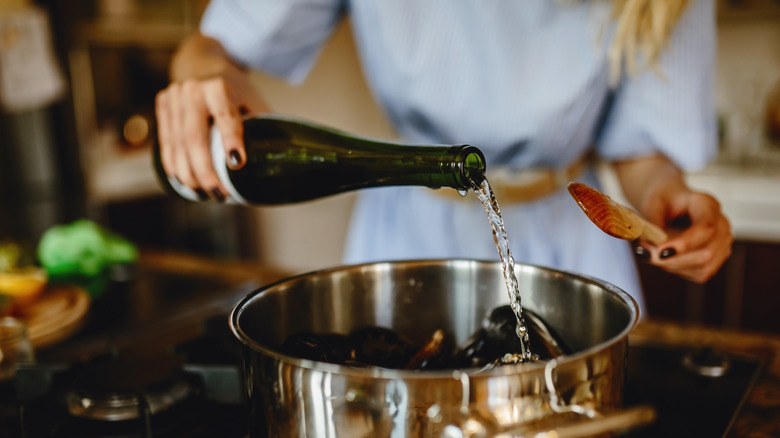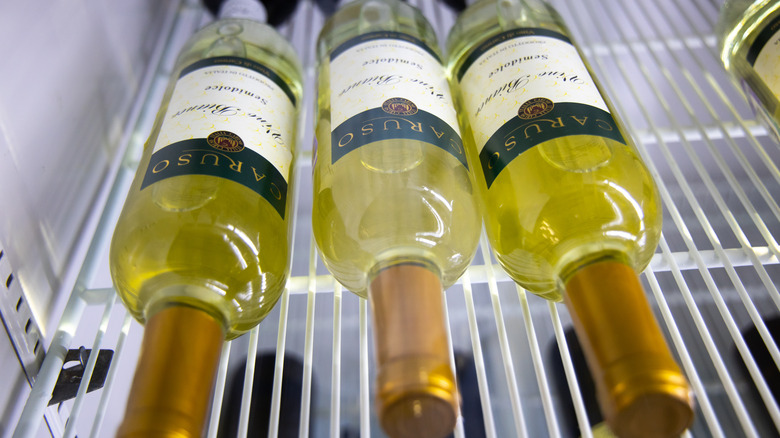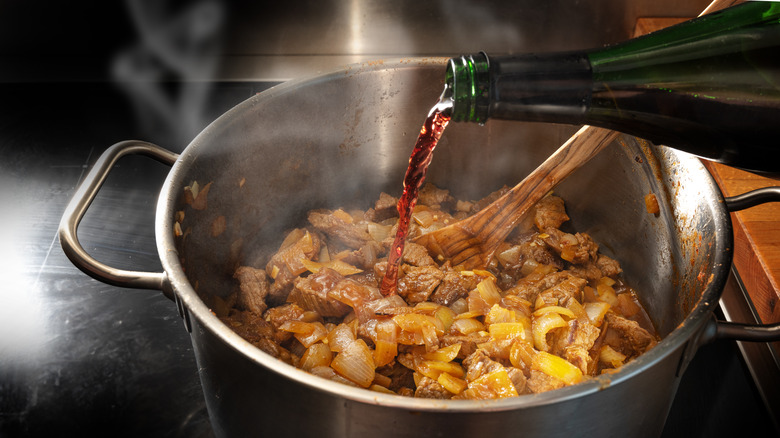Is It Safe To Use Old Wine For Cooking?
Cooking has always been the go-to way to use wine that may have been open just a bit too long for truly enjoyable drinking purposes. But is it safe to cook wine you wouldn't necessarily want to drink anymore? And of corollary concern, how much does the state of the wine affect the taste of the food you're cooking?
According to Bon Appétit, not only is it safe to use old wine for cooking, you can do so for quite a long period of time. In fact, assuming you continue to store the wine properly, red or white wines should remain safe to cook with for up to two months or more. However, as VinePair notes, "the guidelines are nuanced." Meaning, not only does how long your wine has been open and how it's been stored matter, but so do a number of other factors as well.
How to properly store wine
First things first ... there's no need to consign your half-open cabernet sauvignon or chardonnay to cooking duties just because it has been open overnight. Wine once opened and exposed to oxygen begins to oxidize, a chemical process that over time will degrade the wine and make it undrinkable. But, as Wine Folly explains, most wines remain drinkable for three to five days after they are opened. This timeline will depend upon the type of wine, of course. Red wines, for example, typically last a bit longer than white wines because they have more tannins, and per Decanter, these chemical compounds play an important part in wine's ability to age.
But after three to five days, you can begin to consider using your old wine for cooking purposes, from braising meats to flavoring stews. Remember, proper storage is essential to extend the wine's life. According to Chef's Vision, keeping the wine in the refrigerator on its side, with the cork in, will help preserve the wine for cooking use for up to two months or more. It's very important, however, to keep wine away from heat — at least until you're cooking with it. Heat expedites the degradation of wine. A cool refrigerated environment helps to preserve it.
Using wine for cooking
As VinePair points out, though, some wines simply cannot be saved, explaining that "If a wine contains a flaw like cork taint or volatile acidity, these characteristics are imparted to the dish." Thus, these old, spoiled wines must be discarded. For all other wines, store them properly, and keep on cooking. The bottle will almost surely be emptied long before its usefulness expires.
Cooking concentrates the flavors of wine while evaporating most of the alcohol. With older, properly preserved wines, the gradual diminishment of nuance in the bottle isn't an issue, since as Fine Cooking observes, the flavors that are important to wine-drinking "won't survive cooking." Rather, the issue becomes one of maximizing flavor by using the wine properly.
That opened bottle of white may be perfect for sautéing or a creamy sauce for chicken or fish, whereas your red wine may be best used for braising, marinades, or slow-cooked stews, and tomato sauces. Use judgment, and find dishes or recipes for which the wine variety is appropriate to enhance flavor. Enhancement is what wine is for, after all, whether you're drinking it at dinner, or using it as an ingredient to prepare dinner.


